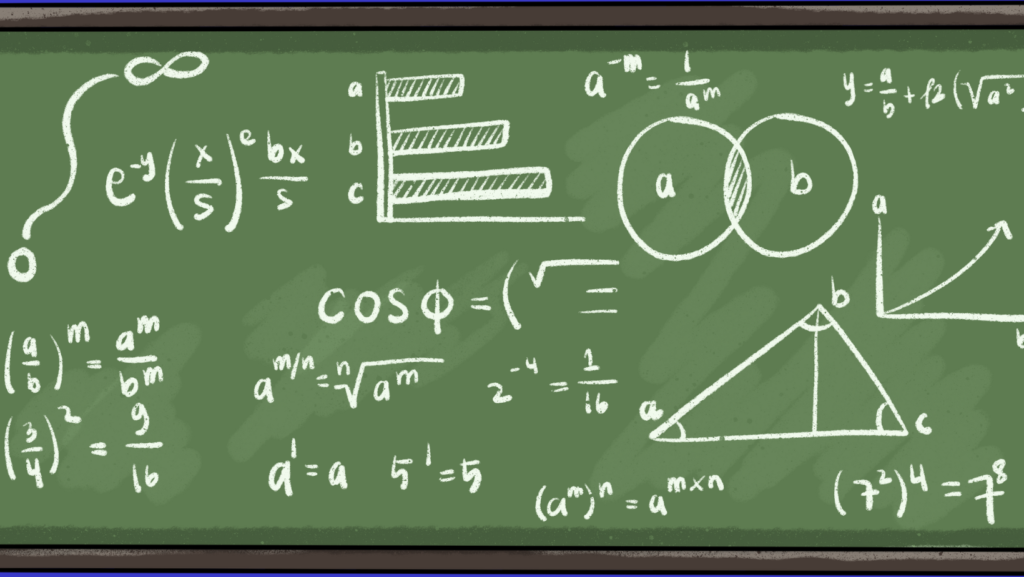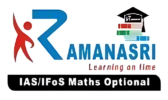How to Crack IAS with best UPSC Maths Optional Lectures of RAMANA SRI IAS

How to Crack best UPSC Maths Optional Lectures
How to crack IAS with best UPSC Maths Optional Lectures of RAMANA SRI IAS. Tto crack IAS with Maths Optional is one of the scoring optional subjects in UPSC exam, provided you prepare well and practice questions. The key to success in this subject is understanding formulas and concepts, and presenting answers step-by-step. It is also important to study previous years question papers.
To succeed in this subject, you must have a passion for it. It is a difficult subject to master and requires a lot of practice.
UPSC Maths Optional Lectures | It is a scoring optional subject
If you are a serious IAS aspirant and want to score well in the exam, it is important to prepare for the optional subjects. Although maths is not as popular as humanities, it has many advantages and can be a scoring subject. The main advantage of this subject is that it’s a logic-based topic and doesn’t require you to memorize a lot of formulas. However, the preparation time for this subject is more than other subjects, as you have to solve problems and come up with creative solutions.
If you are preparing for the UPSC Maths optional exam, it’s essential to know the syllabus and practice previous years exam papers. This will help you figure out which topics are difficult. It is also a good idea to read relevant parts of the study material and take notes on concepts that you find confusing. In addition, it is important to be systematic while writing answers in the optional paper. You can do this by studying the answer scripts of toppers and taking feedback from mentors.
The maths optional syllabus is balanced between theorems and applications. The theorems part makes up about three percent of the exam, so it is important to understand the theory. It’s also helpful to practice with previous years questions to get a feel for the types of questions that will be asked in the exam.
To score high in the UPSC Maths optional lecture, you should follow a strict study plan. You should allocate fixed time for revision and practice through previous years full-length papers and mock tests. You should also practice problem-solving as much as possible, as this will improve your speed and accuracy. In addition, you should try to find a good online coaching tutorial that provides UPSC Maths optional lectures. This will save you a lot of money and time in the long run.
To get a good grade in the UPSC maths optional, you must be able to apply your knowledge of logic and logical reasoning to answer problems. You can do this by analyzing patterns and identifying mistakes in your answers. Practicing these skills will help you avoid making silly mistakes during the exam, and it will increase your chances of passing the test.
UPSC Maths Optional Lectures | It is a difficult subject
Maths is one of the most difficult subjects to master for UPSC aspirants. It requires a great deal of discipline and dedication to develop concepts and practice them. However, it is possible to crack the subject with proper guidance and effort. There are many coaching institutes and mentors who offer expert guidance in the preparation of this subject. These experts can help you with the right study plan and books for your exam. They can also provide tips for solving questions and understanding the logical flow of the subject.
To pass the UPSC Maths Optional exam, you must first familiarize yourself with the syllabus and previous years question papers. You should also try to take as many mock tests as you can. This will help you identify the areas in which you need to improve your knowledge. You should also learn how to present your answers in a logical manner, as this is an important aspect of scoring high marks.
The most important thing is to have a good attitude towards the subject and to stay calm during your exams. This will help you perform better and concentrate better. You must also prepare a detailed study schedule and stick to it. Make sure you allocate enough time for each topic based on its weightage in the mains examination. It is also important to choose the best study materials and study material for UPSC Mathematics optional. You can find these online or at a local bookstore.
A good strategy for preparing the subject is to create a timeline and study daily, weekly, and monthly. This will help you focus on the most important topics and keep track of your progress. You can also use the latest edition of a book to understand the topics thoroughly.
Another important tip for preparing UPSC Maths optional is to have a good understanding of the theory behind each concept. This will help you grasp the concepts more easily and help you solve questions more quickly. It is also important to avoid making silly mistakes while answering questions. These mistakes can decrease your score and prevent you from getting a high rank.
UPSC Maths Optional Lectures |It is a well-balanced subject
If you are a science graduate and are thinking about taking maths as your optional subject, it is important to consider the pros and cons of this choice. While it is a difficult subject, it also helps you develop analytical skills and improve your problem-solving abilities, which will be very useful in the main exam and the interview. The subject also provides you with a solid foundation for many other subjects.
The mathematics optional lectures help you understand the concepts of the subject in an easy-to-understand way. These videos cover the entire syllabus and have questions and answers to guide you through the subject. You can even use them to practice for the exam. Moreover, they provide you with detailed explanations and examples of each topic. This will help you prepare better and score higher in the exam.
Avinash Singh Sir is an expert in guiding UPSC aspirants with the mathematics optional subject. He has a distinguished background as an ex-IES officer and brings a lot of practical expertise to his teaching. He is well known for his ability to simplify complex questions and make them easier to understand. His students appreciate his knowledge and mentoring skills.
The mathematics optional lecture is a well-balanced subject, and it covers the basics of geometry, linear algebra without matrices, modern algebra and ordinary differential equations. It is a good option for those who want to score high in the main exam and improve their analytical skills. However, you need to be very careful when choosing this subject as it can be confusing.
To do well in this subject, you need to be familiar with the syllabus and previous years exam papers. It is also important to practice questions and take mock tests. You should also avoid cramming and focus on building a logical flow in your questions. You should also study answer scripts of toppers and take feedback from your mentors.
The mathematics optional subject consists of two papers, each worth 250 marks. Depending on the weightage of the paper, you should prepare a schedule that includes studying the subject at regular intervals and revising it thoroughly. Moreover, you should also take note of the marking scheme and how it changes over time. This will give you a good idea of the marks that should be allocated to each topic.
UPSC Maths Optional Lectures |It is a subject that requires a lot of practice
In IAS exam, maths is a subject that requires a lot of practice. This is because it involves complex concepts and difficult formulas that are hard to understand without guidance. Students who want to score well in this subject must prepare early and have a clear strategy. If they don’t, they will struggle to get through the exam.
Choosing the right optional subject is a crucial decision for UPSC aspirants. A high score in the optional subject can help boost their overall rank and increase their chances of getting a good job. However, this is only possible if the aspirant has a strong interest in maths and is dedicated to its preparation. In order to prepare for the exam, students should read relevant books and study past years question papers. Moreover, they should also practice solving multiple-choice questions as much as they can.
The UPSC Maths Optional Lectures syllabus is divided into two parts: Paper 1 and Paper 2. The former covers topics like Linear Algebra, Calculus, Analytic Geometry, Ordinary Differential Equation, and Statics. The latter covers advanced topics, such as Real Analysis and Partial Differential Equations. Unlike other subjects, the scoring of mathematics is not subjective and is based on objective facts. Therefore, it is important to learn the fundamentals of each topic in order to pass the exam.
There are many ways to prepare for the UPSC Maths Optional Lectures exam, including taking classes and following online tutorials. It is also a good idea to subscribe to a telegram channel that provides study material and guidance. This can help you save time and money by avoiding unnecessary expenses.
It is important to keep in mind that the UPSC Maths Optional Lectures are often harder than regular exams. They require a lot of practice and an analytical approach. In addition, it is helpful to have a mentor who can explain complex topics and help you develop your problem-solving skills.
The best way to pass the UPSC Maths Optional Lectures is to do a lot of revision. You should also practice full-length papers and mock tests from previous years. In addition, you should be systematic when writing your answers. It is helpful to glance through topper’s answer scripts and get feedback from your mentors. Also, avoid cramming as it can lead to poor marks
